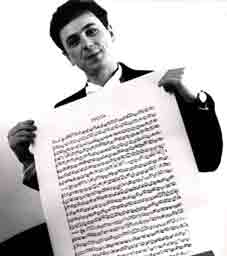Georgians show what they have to offer
By Rumwold Leigh
Wednesday, February 4

The evening began with speeches from the Apostolic Nuncio, Zakaria Paliashvili Music School Director Nino Mamradze, a representative of sponsor the Fondazione San Remo and the Georgian Ambassador to Italy, in which country and The Vatican the orchestra will perform a number of concerts. The Apostolic Nuncio dedicated the concert to the heath of Patriarch Ilia II, a gesture which went down well with the multinational and often well-connected audience, including several Ambassadors and cultural figures and past and present Conservatoire students.
The first half of the programme, conducted by Veronese conductor and flautist Giampaolo Pretto, consisted of a performance of Mozart’s G major piano concerto (K453). The Apostolic Nuncio had previously announced that the soloist, Ana Kipiani, “although very young, had won numerous awards.” Mozart presents a number of potential pitfalls for young performers, principally the temptation to confuse balance with restraint and to try and be too clever by half, as a large element of any Mozart piece is a big wink to his own intellect. It was easy to see however why Ana Kipiani had won so many awards. As with all fine pianists, the piano became an extension of herself rather than a separate entity, her smooth execution of a technically difficult piece being far more characteristic of someone of the stature and maturity of Bernard Roberts. The performance was about the music, not her, as Mozart should always be.
Despite Ana’s fluidity the performance was occasionally slightly off dynamically, sometimes crossing the line between Mozart and Beethoven, but could stand alongside any others the concert audience is likely to hear. A tearfully appreciative Ana, called back for an encore, complied with Mashkovsky’s Eticules, a bravura piece again performed with authority rather than show.
The second half was devoted to Brahms’ Serenade opus 11, which like the Mozart choice appears to be designed to demonstrate that Georgians can handle the standard classical repertoire as well as local music unfamiliar to an international audience, which might make the country and its music appear isolated. It was a good idea to combine balanced classicism with high romanticism, and this performance concentrated on the commonalities between the two. The price to pay for the listener was not gaining a clear idea what the music actually meant, only that it was well-expressed. However the object of the exercise was to show what Georgians can do, and in this respect it certainly succeeded.
As in the first half, the orchestra demonstrated an unusual refinement and seamless technical skill which was an expression of the notes rather than being something taught. This is doubtless largely due to the conductor Mr. Pretto, who has clearly developed a rapport with the players, who did not need to be told what is expected of them and were consumed by the same common energy, which they appeared to be glad was coming from him, a maestro they had adopted as their own to lead them to a musical promised land.
To the particular delight of Georgians present the orchestra performed Revaz Laghidze’s Sachidao (‘wrestling music’) as an encore. This rousing piece however had the opposite effect to the one the organisers intended, preventing them from turning the lights up and letting the players go home. Called back for more, Mr. Pretto declared that they had finished the music, but this made no difference. A second rendering of Sachidao did however send everyone home happy, wishing the orchestra well for its forthcoming tour.
At this concert the Zakaria Paliashvili Youth Orchestra achieved something significant – it played as an orchestra which did not need to hide behind the word “youth” in its title. The big question is: will demanding Italian audiences come away with a new appreciation of Georgian musicians? Italians often claim their country is the home of fine music. Those who see this orchestra however will know that it is not the only one.
